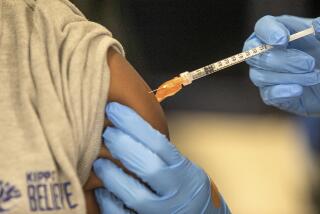Risks Found in DPT, Rubella Vaccines : Health: A study finds the childhood preventives may be linked to adverse effects but the benefits still far outweigh drawbacks.
- Share via
WASHINGTON — Two common childhood vaccines--DPT and rubella--appear to be linked to adverse health effects but the benefits of their use continue to far outweigh the relatively minuscule risks, a study by the Institute of Medicine concluded Wednesday.
The study found that the mandatory DPT vaccine, which protects against diphtheria, pertussis and tetanus, appears to cause an extremely rare but potentially fatal allergic reaction among a handful of recipients.
DPT vaccinations also have been linked to temporary discomfort among a larger group of recipients, the study shows, while rubella vaccine, which protects against German measles, appears to cause arthritic symptoms in some women.
But the 11 pediatricians and public health researchers who directed the study said that the “causal relationships” are too unclear to warrant any changes in current policies regarding administration of the vaccines.
“There’s no question that vaccines, as a group, have been the most important advance in medical care in modern times. But this most nearly perfect medical miracle is flawed and it does occasionally produce these adverse events, although the risks that we found, when they occur, are very infrequent,” said Dr. Harvey V. Feinberg, dean of the Harvard School of Public Health and chairman of the study committee.
“Overall, the study is very reassuring,” Feinberg noted.
Feinberg and the other study participants called for additional studies to further clarify the link between the vaccines and their side effects. “There are substantial gaps in the knowledge base that must be filled,” Feinberg said.
The study called attention to three general types of adverse reactions, one linked to the rubella vaccine and two to the DPT vaccine.
The rubella vaccine is commonly given during the second year of life, followed by a booster in later childhood. But some women are vaccinated only upon reaching child-bearing age, since German measles can prove fatal to a fetus. Among such women, 13% to 15% were found to have developed acute arthritis after receiving the vaccine.
That condition usually goes away within two weeks, often in days, according to Dr. Richard B. Johnston, a Philadelphia pediatrician and University of Pennsylvania medical school professor who served on the Institute of Medicine panel. The institute is an arm of the National Academy of Sciences.
In only a handful of those cases, Johnston said, did the condition become chronic.
With the DPT vaccine, which is required by most states before a child may enter school, the study found that up to 6% of recipients developed “protracted, inconsolable crying,” a condition that generally went away in a day or two, most often in less than 12 or 24 hours.
The potentially deadly but far more rare condition caused by DPT vaccine is known as anaphylaxis, a hypersensitivity to drugs that can result in shock. The panel was able to clearly document only four cases “out of hundreds of million of shots,” Johnston said.
“It’s a very rare event,” said Dr. Georges Peter, a Rhode Island doctor and chairman of the infectious diseases committee of the American Academy of Pediatrics.
“Parents should be concerned about this and be aware of it, but they also should keep in mind that the benefits are much greater than the risks,” Johnston said.
He emphasized that the study, commissioned by Congress, also in effect exonerated DPT vaccine as a potential cause of serious brain damage.
In the 1970s, there were widespread anecdotal accounts linking brain damage to the vaccine, and it went virtually unused for a time in Great Britain. Only after a sharp rise in deaths from whooping cough did the vaccine make a comeback, Johnston said.
The inch-thick report, relying on ambiguous parlance common in scientific circles, also said that the panel found “no evidence” to link DPT to a state of mind known as autism, another prevalent fear.






